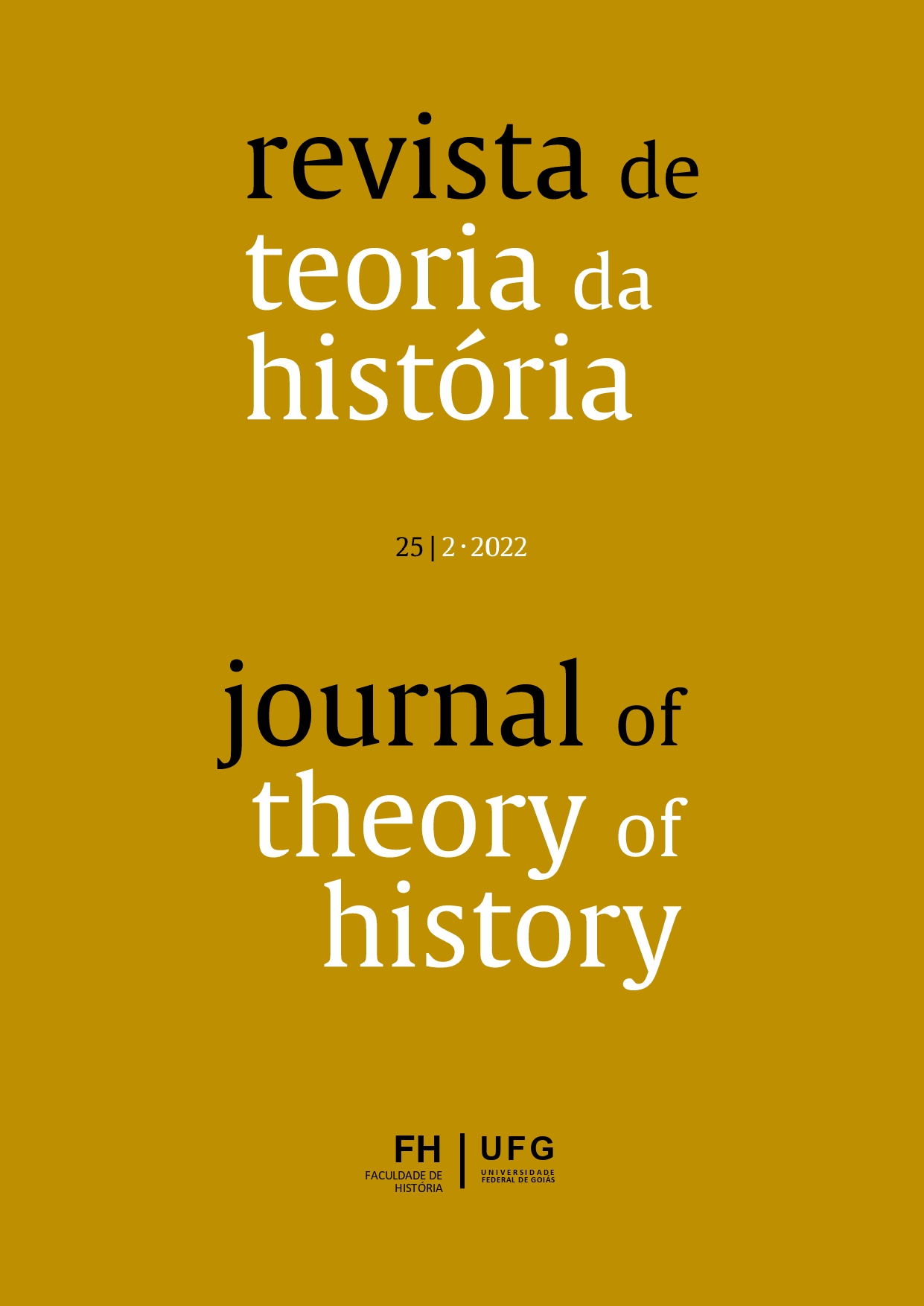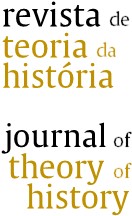O passado como distração
Modos de vestir a história no neopopulismo brasileiro
DOI:
https://doi.org/10.5216/rth.v25i2.74060Palavras-chave:
Atualismo, Neopopulismo brasileiro, Bolsonarismo, BolsonaroResumo
Neste ensaio analisamos como o movimento populista encarnado por Bolsonaro se engaja com a história de uma forma que ativa sua base política heterogênea. Esses engajamentos parecem ser diferentes de alguns aspectos das cronossofias modernas, como o abandono da sincronização e a apresentação coerente de uma história nacional. Em vez disso, a nova historicidade populista da extrema direita brasileira se baseia mais no apego afetivo, uma performance histórica pragmática e altamente fragmentada que, como defendemos, mais se assemelha a uma historicidade que chamamos de “atualismo”. Para demonstrar a afinidade que vemos entre essa historicidade chamada de atualismo e a versão específica bolsonarista do chamado neopopulismo, este artigo está dividido em três partes. Primeiro, apresentamos o conceito e a teoria do atualismo. Em seguida, caracterizamos as dimensões neopopulistas do bolsonarismo, ou seja, o movimento cultural e político representado por Jair Bolsonaro. Por fim, analisamos o novo populismo brasileiro em seus engajamentos com a história, especialmente as atuações da história pelos três secretários de cultura do governo Bolsonaro e como a desfactualização da realidade ganha força, criando as condições de possibilidade de o passado ser como um grande guarda-roupa cheio de imagens e modelos de prêt-à-porter.
Referências
ABRANCHES, Sérgio. O tempo dos governos incidentais. São Paulo: Companhia das Letras, 2020.
ANDERSON, Perry. Bolsonaro’s Brazil. London Review of Books, 2019. Disponível em https://www.lrb.co.uk/the-paper/v41/n03/perry-anderson/bolsonaro-s-brazil. Acesso em 15 mar 2022.
ARAUJO, Valdei L. et al. Bolsotrump: realidades paralelas (2020-2022). Editora FGV, 2022.
ARAUJO, V. L.; PEREIRA, M. H. de F. Updatism: Gumbrecht's broad present, Hartog's Presentism and beyond. Diacronie: Studi di Storia Contemporanea, 43: 1-21, 2020.
ARAUJO, V. L.; PEREIRA, M. H. F. Atualismo 1.0: como a ideia de atualização mudou o século XXI. Vitória: Milfontes, 2019.
BARLETT, Lesley; VAVRUS, Frances. ‘Comparative Case Studies’. Educação & Realidade, 42(3): 899-920, 2017.
BERRY, David M. The Philosophy of Software. New York: Palgrave MacMillan, 2011.
BERRY, David M. Critical Theory and the Digital. London: Bloomsbury, 2014.
BRIGGLE, Adam. Dear Facebook?, in D.E. Wittkower (ed.), Facebook and Philosophy, pp. 161-172. Chicago: Open Court, 2010.
BURITY, Joanildo. The Brazilian Conservative Wave, the Bolsonaro Administration and Religious Actors. Brazilian Political Science Review, 15(3), 2021.
CHAGAS, Viktor. Meu malvado favorito: os memes bolsonaristas de WhatsApp e os acontecimentos políticos no Brasil. Estudos Históricos, 34: 169-196, 2021.
CHEYFITZ, Eric. The Disinformation Age. New York: Routledge, 2017.
CLAVERT, Frédéric. Face au passé : la Grande Guerre sur Twitter. Le Temps des médias, 31(2): 173-186, 2018.
FERES, João; GAGLIARDI, Juliana. Populism and the Media in Brazil: The Case of Jair Bolsonaro. In: KOHL, Christoph et al (ed.), The Politics of Authenticity and Populist Discourses, p. 83-104. New York: Palgrave Macmillan, 2021.
FINCHELSTEIN, Federico. From Fascism to Populism in History. Berkeley: UCPRESS, 2019.
GAGO, Verónica. Neoliberalism from Below. Durham: Duke Universiy Press, 2017.
GOMES, Angela. M. de Castro. The History and Historiography of Populism in Brazil (1930 - 1964). Oxford Research Encyclopedia of Latin American History. Oxford: Oxford University Press, 2021.
GOMES, Angela. M. C.; DEVOTO, Fernando. J. Le gouvernement Bolsonaro : ni fascisme ni populisme, autoritarisme radical. 2020. Disponível em: https://www.politika.io/fr/article/gouvernement-bolsonaro-fascisme-populisme-autoritarisme-radical. Acesso em 15 mar 2022.
HEIDEGGER, Martin. Sein und Zeit. Tübingen: Max Niemeyer Verlag, 2006.
HEIDEGGER, Martin. Being and Time. New York: State University of New York Press, 2010.
ISAAC, Mike. Super Pumped: The Battle for UBER. New York: W. W. Norton & Company, 2019.
JUNGE, Benjamin; TAVARES, Álvaro P. Aguiar . Subjetividades Móveis: sentidos de periferia e percepções da crise entre motoristas de uber em Recife. Dossiê subjetividades periféricas• Novos estud. CEBRAP 39 (1) • Jan-Apr 2020.
KLEN, Bruna. et al (ed.) Do fake ao fato. Vitória: MilFontes, 2020.
LEE, Newton. Facebook Nation: Total Information Awareness. New York: Springler, 2014.
MACKINNON, M. M.; PETRONE, M. Populismo e neopopulismo en America Latina. Buenos Aires: Eudeba, 1998.
MOFFIT, Benjamin. The Global Rise Of Populism. Stanford: Stanford University Press, 2017.
MOFFIT, Benjamin. Populism versus technocracy in: COSSARINI, Paolo et al. (eds.), Populism and Passions, p. 49-64. London: Routledge, 2019.
MORGAN, R.; CLULOW, J. The Proles and Cons of Facebook, in: WITTKOWER, D.E. Facebook and Philosophy, p. 258-9. Chicago: Open Court, 2010.
OLIVEIRA, Rodrigo Perez; PINHA, Daniel. (org.). Tempos de Crise: ensaios de história política. 1. ed. Rio de Janeiro: Autogradia, 2020.
OLIVEIRA, RODRIGO PEREZ. O negacionismo científico olavista: a radicalização de um certo regime epistemológico. In: Valdei Araujo; Mateus Pereira; Bruna Klem. (Org.). Do Fake ao Fato: (Des) atualizando Bolsonaro. 01ed.Vitória, ES: Mil Fontes, 2020, v. 01, p. 71-90.
PAULA, Carolina et al. Bolsonarismo no Brasil. 2021. Disponível em: https://iree.org.br/wp-content/uploads/2021/08/Pesquisa-Bolsonarismo-no-Brasil.pdf. Acesso em 15 mar 2022.
PEREIRA, LUISA RAUTER. Fissuras do Presentismo: Mudança Histórica nos Protestos Políticos Contemporâneos. TEMPO E ARGUMENTO, v. 13, p. e0301, 2021.
PEREIRA, Mateus. H. F. Lembrança do presente: Ensaios sobre a condição histórica na era da internet. Brasil: Autêntica Editora, 2022..
PEREIRA, Mateus; ARAUJO, Valdei. Vozes sobre Bolsonaro, in: KLEN, Bruna et al (ed.) Do fake ao fato, p. 115-140. Vitória: Milfontes, 2020.
PEREIRA, Mateus; MARQUES, Mayra; ARAUJO, Valdei. Almanaque da Covid-19. Vitória: Milfontes, 2020.
PIMENTA, João Paulo G. et al. A Independência e uma cultura de história no Brasil, Almanack, 8: 5–36, 2014.
RAMALHO, Walderez. Reinterpreting the times of crisis based on the asymmetry between chronos and kairos. História da Historiografia, 14(35): 115-144, 2021.
ROCHA, Camila; SOLANO, Ester ; MEDEIROS, Jonas. The Bolsonaro Paradox. Londres: Springer, 2021.
ROCHA, João César C.. Guerra Cultural e Retórica do Ódio. São Paulo: Caminhos Editora e Livraria, 2021.
TAMAKI, Eduardo Ryo.; FUKS, Mario. Populism in Brazil’s 2018 general elections, Lua Nova, 109: 103-127, 2020.
VALENCIA-GARCÍA, Louie Dean (ed.) Far-Right Revisionism and the End of History: Alt/Histories. New York: Routledge, 2020.
ZUBOFF, Shoshana. The Age of Surveillance Capitalism. New York: Hachette Book, 2019.
ZÚÑIGA, Homero Gil. Populism in the era of Twitter. New Media & Society, 22(4): 585-594, 2020.
Downloads
Publicado
Como Citar
Edição
Seção
Licença
Copyright (c) 2022 rth |

Este trabalho está licenciado sob uma licença Creative Commons Attribution-NonCommercial-NoDerivatives 4.0 International License.
A Revista publica única e exclusivamente artigos inéditos. São reservados à Revista todos os direitos de veiculação e publicação dos artigos presentes no periódico.
Licensed under a Creative Commons Attribution-NonCommercial-NoDerivatives 4.0 International License



